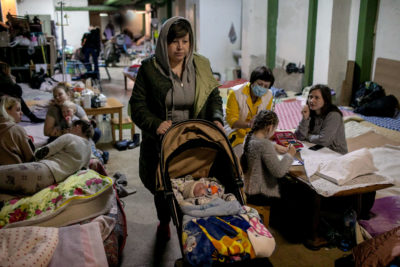
We’re starting to plan our community’s response for the arrival of Ukrainian refugees to our shores. In the coming days we’ll be convening groups from agency and programmatic partners, to think through our available resources, and reaching out to our State and Federal partners. We don’t yet have a full idea of the numbers of refugees coming, but we know that we have a responsibility, on behalf of our Jewish community, to be ready to reach out and welcome those who arrive. If you have suggestions, ideas, or want to offer some feedback, you can reply back to me at this email address. I’ll be speaking on Wednesday evening at 8pm on zoom with Temple Beth Shalom in Livingston, and in-person Erev Shabbat for services Friday night at Temple Sholom of West Essex. For information on both, you can check out their (or my) social media, or just ask me for information. Here is the latest update from our national and international Jewish Federations partners and colleagues. After almost six weeks of fighting, the war continues in Ukraine. Millions of Ukrainians, including tens of thousands of Jews, have fled the country and millions of others are internally displaced. Jewish Federations and our partners continue to work together to ensure that urgent relief reaches the neediest.
THE LATEST DEVELOPMENTS
- Much of the world has been shocked by images from the town of Bucha, near the Ukrainian capital Kyiv, that showed the bodies of at least 20 civilians strewn across a street. Media also reported on a mass grave in the city. The Ukrainian Government has called on the International Criminal Court to investigate the killings. The Russian Ministry of Defense, in response, claims that the footage was fake.
- In response, French President Emmanuel Macron has called for an immediate and total blockage of Russian exports of coal and oil to the European Union.
- The city of Odessa, which has so far been relatively calm and even served as a haven for displaced Ukrainians, was hit by Russian strikes last night.
- The director of the Jewish community of Ivano-Frankivsk in Ukraine was stabbed by an assailant yelling anti-Semitic slurs at the end of last week. The attack happened during the distribution of meals to the needy. The director has since been released from hospital and the perpetrator was arrested, with criminal proceedings opened against him.
- According to the UN Human Rights office (OHCHR), at least 1,417 civilians have died in Ukraine (including121 children) since the Russian invasion began. At least 2,038 civilians have been injured. The number of soldiers killed is unknown.
ISRAEL
In response to the images from Bucha, Israel’s Foreign Minister Yair Lapid said, “It is impossible to remain indifferent in the face of the horrific images from the city of Bucha near Kiev, from after the Russian army left. Intentionally harming a civilian population is a war crime and I strongly condemn it.” However, Finance Minister Avigdor Liberman said that while Israel “condemns all war crimes,” there are “mutual accusations” about this situation that are flying between Russia and Ukraine, and that Israel’s own interests come first. In response, Ukrainian Ambassador to Israel Yevgen Korniychuk said, “I invite Mr. Liberman to come to Ukraine. We will take him with a convoy to Bucha and to other places where he can see for himself the bodies of civilians and meet the women who were tied up and raped. Maybe then he will know what happened.” Meanwhile, the Israeli government has joined forces with Magen David Adom (Israel’s national emergency medical response organization) and Federation partner JDC to launch a special program designed to take care of Ukrainian asylum seekers who are not eligible for Aliyah. The program, which is called Tzav HaSha’a (The Hour of Need), uses dozens of Russian and Ukrainian-speaking social workers to assist asylum seekers. A hotline was launched in order to provide detailed information on the program in both Russian and Ukrainian. The program provides free health insurance, comprehensive medical assistance, temporary accommodation, food assistance and material aid, and the placement of children in welfare centers and day care centers.
Israel’s Minister of Health Nitzan Horowitz became the first Israeli minister to enter Ukraine since fighting began, when he visited the Israeli field hospital in Mostyska, today. The hospital is staffed by a team of medical professionals led by Dr. David Dagan alongside 60 staff members from the Sheba Medical Center. The hospital, financed in part by Federation-supported JDC, is Israel’s flagship humanitarian effort and is scheduled to be active for at least one month. Leaders of Jewish Federations who were traveling earlier today on a bus on their way to the Ukrainian border with Poland spoke with the Minister near the town of Lublin. As a result of the fighting in Ukraine, Israeli farmers are destroying thousands of tons of fresh vegetables as produce exports to Russia and Ukraine have almost completely ground to a halt. Up to 50,000 tons of agricultural products destined for the two countries are currently rotting in warehouses. Payments for goods have also stopped as a result of the plummeting value of the ruble and sanctions against Russia.
FLEEING UKRAINE, FEDERATIONS, AND PARTNERS ON THE GROUND
In just over the one month since the fighting began, Jewish Federations have raised more than $43.4 million for Ukrainian relief efforts. JFNA’s Special Allocations Committee has already met three times to designate funds for Ukrainian relief. The relief efforts are being undertaken by our Federation partners, The Jewish Agency for Israel, The American Jewish Joint Distribution Committee, and World ORT; as well as by United Hatzalah, Hillel International, Nefesh B’Nefesh, HIAS, the Israel Trauma Coalition, Hadassah Medical Organization, Chabad, Shma Yisrael, Project Kesher, JCC Krakow and the Emergency Volunteer Program.
Among other urgent needs, the funds will go towards:
- Providing housing, clothing, medication, cash assistance, mental health services, security, and transportation for Ukrainians sheltering in place, refugees fleeing the war and those seeking to make Aliyah.
- Ensuring the secure evacuation of affected individuals from areas under immediate threat or where active hostilities are already taking place.
- Expediting the rapid Aliyah of those individuals or families who wish to move to Israel and facilitating their absorption on arrival.
- Trauma-focused therapy and emotional first-aid training for those helping refugees outside of Ukraine, as well as for mental health professionals treating patients inside of Ukraine.
- Supporting delegations of medical professionals on the ground in neighboring countries who are treating incoming refugees and providing support to the Ukrainian health system.
- Providing assistance to Ukrainian refugees in Israel.
The Biden Administration at the end of last week announced further assistance to Ukraine in the amount of $500 million in direct budgetary aid. This is in addition to the more than $15 billion of humanitarian and security aid given over the last few weeks. The government has also authorized the immigration to the United States of 100,000 Ukrainian refugees. The first contingent of Russian-speaking Jewish professionals from North America arrived at the Ukrainian border this week to provide translation services and humanitarian assistance. The program is being coordinated by our Jewish Federations in collaboration with the Jewish Agency and the JDC. The Jewish Agency for Israel has, so far, brought 7,000 Ukrainian Jews to Israel as olim or as eligible to make Aliyah. In the coming week, at least another 1,000 are expected to arrive. The Agency expects this number to surpass 10,000 in the next two weeks and approach 15,000 shortly afterwards. This number represents five times the number of olim who came from Ukraine in all of 2021.
The American Jewish Joint Distribution Committee (JDC) continues to operate in Ukraine and bordering countries. JDC’s relief efforts include:
- Executing and coordinating evacuations across Ukraine, including arranging transport and safe accommodations both inside Ukraine and beyond.
- Providing food, medicine, and other urgent support for Jews who are not in refugee camps or shelters and providing financial assistance to newly vulnerable individuals.
- Staffing key border crossings along with European community partners and volunteers to embrace, inform, and assist refugees fleeing harm’s way as they arrive in Poland, Moldova, Hungary, and Romania, while also working to coordinate shelter and home hospitality.
- Operating emergency hotlines in collaboration with local Jewish communities in Ukraine, Bulgaria, Poland, Moldova, Germany, Hungary, Israel, Romania, Estonia, Latvia, and Slovakia.
- Providing JDC welfare recipients with extra essentials like food and medicine, while creating an SOS Fund for extraordinary individual needs. JDC is also allocating financial war-time support for Jewish community organizations in Ukraine.
- Coordinating its emergency response with other agencies on the ground to ensure critical assistance reaches Jews in distress across the region.
- Maintaining JOINTECH, a remote care tech initiative launched in 2020 to help combat loneliness among isolated Jewish seniors during the pandemic, to be used for Shabbat and community programming to provide reprieve during this crisis.
The Jewish Agency and JDC have both established emergency hotlines to assist the Jewish community in Ukraine. Jewish Federations have activated our emergency protocols and are working closely with the Government of Israel and our partners to do everything in our power to support efforts that ensure the safety and well-being of the entire Jewish community in Ukraine, as well as to provide as much general humanitarian aid as we can.

